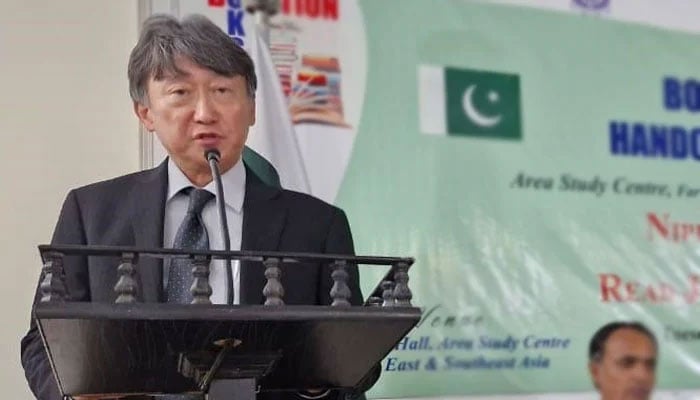Japanese CG highlights importance of human capital in national development
Masaru Hattori, the consul general of Japan in Karachi, addressed the participants of the 43rd Mid-Career Management Course at the National Institute of Public Administration (NIPA).
Officials said the session took place at the NIPA Auditorium and was attended by officers from various autonomous bodies and public sector organisations. Speaking to the participants, Consul General Masaru Hattori emphasized the critical role of discipline, innovation, and strategic policymaking in Japan’s post-war transformation.
He stated, “Japan improved international competitiveness by adapting, internalizing, and enhancing innovative technologies. As business globalized, appropriate policies for foreign capital introduction became necessary.”
He elaborated on the importance of human capital in national development, remarking, “Lifetime employment and seniority-based promotion increased worker loyalty and fostered a culture of diligence. Companies conducted in-house training and OJT (On-the-Job Training) to foster long-term development.”
Referring to Japan’s post-WWII revival, he highlighted how discipline, rooted in Japanese culture and religious values, laid the foundation for rebuilding the nation. “It was this culture of discipline and technological advancement that helped rebuild Japan’s economy after World War II,” he said.
During the Q&A session, when asked about Japan’s aging population and low birth rate, he acknowledged, “This is a serious concern. The average age in Japan is now 50, and the government is designing forward-looking policies to address this demographic challenge.”
Responding to a question on China’s dominance in the Electric Vehicle (EV) market, Hattori said, “Japan is actively working on this challenge. Companies like Toyota are leading the way with innovative EV technologies to maintain global competitiveness.”
Director General NIPA Saifur Rehman also addressed the participants and emphasized the importance of learning from Japan’s innovative and disciplined leadership approach. “Japan is a shining example of how visionary leadership, combined with hard work and innovation, enabled a war-torn country to become a global leader in technology—producing world-class products like televisions, electronics, automobiles, and industrial machinery,” he stated.
The session concluded with a vote of thanks and the presentation of a memento to CG Masaru Hattori. His address was a powerful reflection on resilience, policy reform, and the enduring value of institutional excellence.
-
 AI Copyright Battle: ByteDance To Curb Seedance 2.0 Amid Disney Lawsuit Warning
AI Copyright Battle: ByteDance To Curb Seedance 2.0 Amid Disney Lawsuit Warning -
 Savannah Guthrie In Tears As She Makes Desperate Plea To Mom's Kidnappers
Savannah Guthrie In Tears As She Makes Desperate Plea To Mom's Kidnappers -
 Canada’s Defence Industrial Strategy Targets 125,000 Jobs And Export Growth
Canada’s Defence Industrial Strategy Targets 125,000 Jobs And Export Growth -
 Tre Johnson, Former NFL Guard And Teacher, Passes Away At 54
Tre Johnson, Former NFL Guard And Teacher, Passes Away At 54 -
 Jerome Tang Calls Out Team After Embarrassing Home Defeat
Jerome Tang Calls Out Team After Embarrassing Home Defeat -
 Cynthia Erivo Addresses Bizarre Rumour About Her Relationship With Ariana Grande
Cynthia Erivo Addresses Bizarre Rumour About Her Relationship With Ariana Grande -
 Prince Harry, Meghan Markle Spotted Cosying Up At NBA All-Star Game
Prince Harry, Meghan Markle Spotted Cosying Up At NBA All-Star Game -
 Lady Gaga Explains How Fibromyalgia Lets Her 'connect With People Who Have It'
Lady Gaga Explains How Fibromyalgia Lets Her 'connect With People Who Have It' -
 Metro Detroit Weather Forecast: Is The Polar Vortex Coming Back?
Metro Detroit Weather Forecast: Is The Polar Vortex Coming Back? -
 Daniel Radcliffe Reveals Surprising Way Fatherhood Changed Him
Daniel Radcliffe Reveals Surprising Way Fatherhood Changed Him -
 ‘Disgraced’ Andrew At Risk Of Breaking Point As Epstein Scandal Continues
‘Disgraced’ Andrew At Risk Of Breaking Point As Epstein Scandal Continues -
 Alan Cumming Shares Plans With 2026 Bafta Film Awards
Alan Cumming Shares Plans With 2026 Bafta Film Awards -
 OpenClaw Founder Peter Steinberger Hired By OpenAI As AI Agent Race Heats Up
OpenClaw Founder Peter Steinberger Hired By OpenAI As AI Agent Race Heats Up -
 Kate Middleton's Reaction To Harry Stepping Back From Royal Duties Laid Bare
Kate Middleton's Reaction To Harry Stepping Back From Royal Duties Laid Bare -
 Rose Byrne Continues Winning Streak After Golden Globe Awards Victory
Rose Byrne Continues Winning Streak After Golden Globe Awards Victory -
 Ice Hockey Olympics Update: Canada Stays Unbeaten With Dominant Win Over France
Ice Hockey Olympics Update: Canada Stays Unbeaten With Dominant Win Over France




